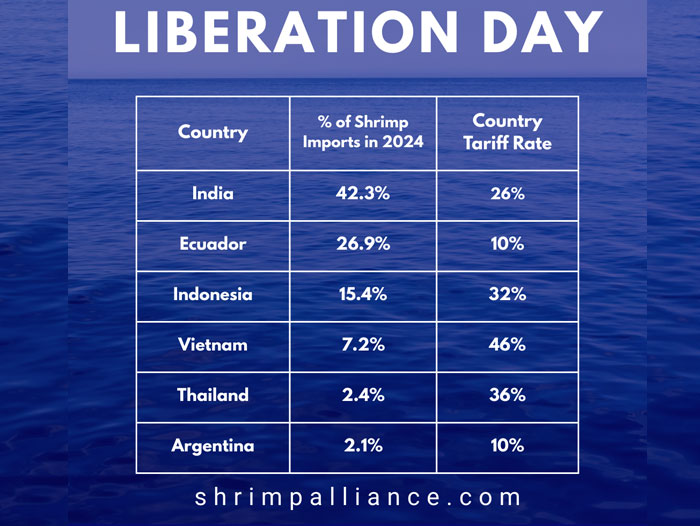U.S. Shrimp Industry Hails New Tariffs as Crucial Lifeline
April 3, 2025 | 7 min to read
The Trump Administration has imposed new tariffs ranging from 10% to 46% on shrimp imports to safeguard American jobs and food security, a move welcomed by the Southern Shrimp Alliance. With 94% of shrimp consumed in the U.S. imported, the tariffs aim to address unfair trade practices and prevent reliance on foreign producers linked to forced labor and environmental harm. John Williams, the Alliance's executive director, emphasized the need for reforms to protect the domestic shrimp industry.

Trump Administration Imposes 10-46% Duties on Countries Exporting Shrimp to the U.S.
In a move aimed at protecting American jobs and ensuring food security, the Trump Administration has announced new tariffs on major shrimp-supplying countries, a decision praised by the Southern Shrimp Alliance.
“We’ve watched as multigenerational family businesses tie up their boats, unable to compete with foreign producers who play by a completely different set of rules,” said John Williams, executive director of the Southern Shrimp Alliance. “We are grateful for the Trump Administration’s actions today, which will preserve American jobs, food security, and our commitment to ethical production.”
Unfair trade policies that disadvantage American shrimpers include billions of dollars in subsidies from international financial institutions to develop foreign shrimp aquaculture, along with widespread use of forced labor, banned antibiotics, and environmental destruction that reduce the cost of shrimp production in major supplying countries.
The U.S. shrimp industry has suffered significant losses in recent years. Since 2021, the prices of imported shrimp have dropped significantly, decreasing their value by more than $1.5 billion. This economic downturn has led the U.S. shrimp industry to lose nearly 50% of its market value, forcing many shrimping businesses to close. Despite the falling wholesale prices, retail shrimp prices have remained historically high for consumers, highlighting the disconnect between wholesale and retail markets.
Food Security Concerns
The tariffs come at a critical moment when 94% of shrimp—and all seafood—consumed in the United States is already imported. This extreme import dependence stands in stark contrast to overall U.S. food imports, which account for just 15% of American food consumption, according to the FDA.
“Our government has been outsourcing our food supply to companies engaged in practices we would never accept on American soil,” Williamsnoted. “Without quickly addressing unfair trade, we are choosing a food supply chain that is fully outsourced to industries that engage in horrible practices. If we wait for systemic reforms, we will lose our domestic shrimp industry.”
The new duties are expected to slow imports and prevent Americans from becoming completely dependent on foreign shrimp producers while the administration addresses harmful trade policies and enforcement deficiencies.
Subsidized Foreign Competition
International financial institutions—supported by U.S. government funds and taxpayer dollars—have invested billions into foreign shrimp aquaculture development, helping multinational companies rapidly displace the well-regulated U.S. shrimp industry.
The total number of shrimp and aquaculture development projects increased significantly in the past decade, primarily in India and Ecuador, which supply nearly 70% of all U.S. shrimp imports and are the largest competitors to the U.S. shrimp industry.
Ecuador alone received over $550 million in development funding for shrimp farming since 2000, with $195 million going directly to private companies competing with U.S. shrimpers. This investment helped fuel a staggering 150% increase in Ecuadorian shrimp exports to the U.S. in just four years. Similar funding has gone to other major producers like India, Indonesia, and Vietnam, creating a global shrimp oversupply.
Ethical and Regulatory Concerns
Most consumers remain unaware that the majority of imported shrimp comes from countries linked to widespread use of forced labor and banned antibiotics—documented by U.S. and foreign governments, human rights organizations, and investigative journalists.
Despite these concerns, many U.S. retailers continue sourcing large volumes of shrimp from the most problematic countries, often relying on inadequate industry certification programs.
“Today’s demand for shrimp is met at a massive human, environmental, and public health cost,” said Williams. “When we outsource our seafood production to industries that use forced labor and environmental shortcuts, we’re making a choice about the kind of world we want to support.”
About the Southern Shrimp Alliance
The Southern Shrimp Alliance (SSA) is an organization of shrimp fishermen, shrimp processors, and other members of the domestic industry in the eight warmwater shrimp producing states of Alabama, Florida, Georgia, Louisiana, Mississippi, North Carolina, South Carolina, and Texas.
